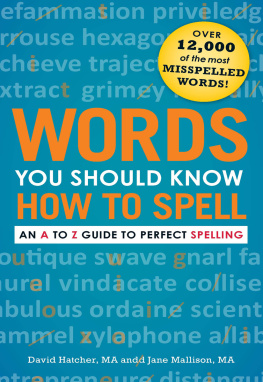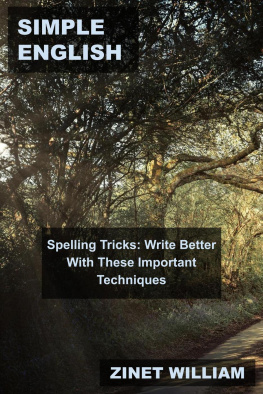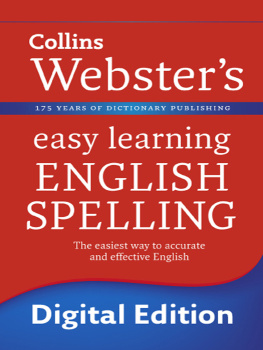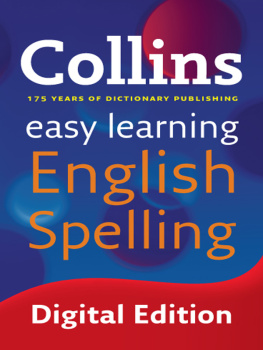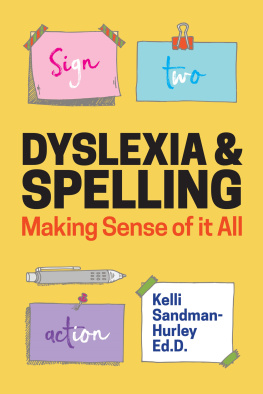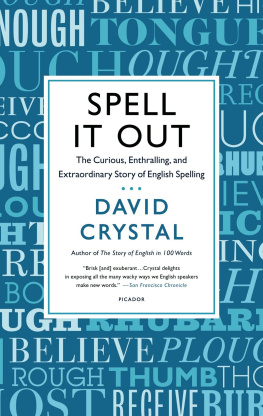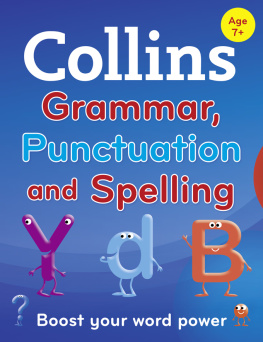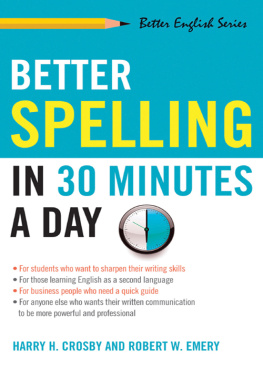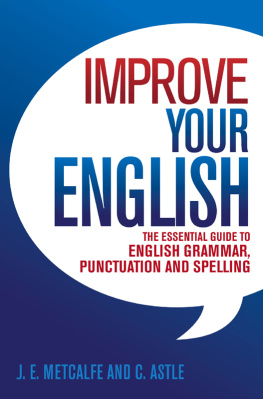We both extend our deep appreciation to Lane Goddard, whose skills with language and software and untiring efforts were so valuable.
We also want to thank our most-careful editors Lisa Laing, Elizabeth Kassab, and Katie Corcoran Lytle and special thanks to our ever-helpful agent, Grace Freedson.
Introduction
I put a spell on you / Because you're mine. Whether sung languorously by Nina Simone or wildly by Screamin' Jay Hawkins, these lines from the song I Put a Spell on You remind us of a peculiar truth. The noun spell with its meaning of a charm put on someone stems from the very same word as spell, the verb that refers to naming off the letters that make up a word.
This surprising ancestry lets us start off this introduction to Words You Should Know How to Spell with a more glamorous aura than spelling usually receives. Equally startling is the fact that the word glamor is a variant of the word grammar. Those of us with awful memories of underlining the subject once and the verb twice find it amazing but it's essentially the same story. Having power over words was what seemingly gave sorcerers their prowess. In a world where recording devices lay far in the future and where most people were illiterate, the very phenomenon of writing packed a magic of its own. Imagine being able to preserve a thought forever by making some little scratch marks! Today, writing is not as novel; nonetheless, power over words remains a vitally important skill.
WHY IS SPELLING IMPORTANT?
A misspelled word in an otherwise well-executed report is like egg on the face of an otherwise impeccably turned-out individual. At a minimum, misspellings can suggest sloppiness, a telling lack of attention to detail. No one wants to write You are my best fried to his buddy, although, of course, the buddy will know what you mean. Yes, good friends do read our minds, but we can't count on mental telepathy with everyone. At their worst, misspellings can lead to downright confusion and misinterpretation. If you received an e-mail that said a co-worker had a rye look on his face, you might think of meanings that a wry look could never convey. Similarly, an imminent storm has only a minuscule chance of becoming an eminent storm. (And yes, minuscule is related to the world of math minus not to the world of tiny mini.)
WHY DO WE MISSPELL?
What's the source of spelling errors? Carelessness, for starters. Lack of sufficient knowledge. Textual editors of F. Scott Fitzgerald, a notoriously weak speller, are still wondering about Fitzgerald's use of orgastic near the end of The Great Gatsby. Did he mean orgiastic? Orgasmic? We don't know. Sometimes, particularly in informal contexts, spelling variants are intentional. They can signal proud rebellion against the mainstream as in the spelling of boys in the movie Boyz n the Hood. Using a z instead of an s for a plural has gained some currency. Will it ever lose its rebel status and infiltrate mainstream spelling? It's possible the plural of eye used to be eyne but none of us are likely to be around for the corporate report that refers to stockz and bondz.
Similarly, technological developments that began in the late twentieth century have made most people particularly those under, say, thirty users of a new kind of spelling shorthand. R U OK? Gr8! C U at 9. (New Yorker writer Adam Gopnik had a wonderful anecdote about frequent instant messaging with his teenage son who was in the next room and believing for months that his son's LOL sign-off meant lots of love.) Expressions like these make you an instant member of an in-group, but their primary benefit is speed. You want to be quick about answering your pal especially if you're typing with your thumb. Will any of these abbreviations ever come into standard English? The letter and number hybrid has a certain chirpy appeal, but it would seem inappropriate to read that the patient was 4tunate that the lab test showed the 2mor 2B B9. Police dogs as members of the K-9 corps may be as far as this device will go, but you never know historians of the early days of printing inform us that some spellings were altered because printers needed more or fewer letters to justify their margins.
Yes, many factors produce deviations from orthodox spelling. Perhaps foremost among them is the very nature of the English language. Writers of Italian and Spanish those beautifully phonetic tongues need to worry much less about spelling; it's the spelling of English that is inconsistent, irregular, and (some say) insane. Mark Twain is well known for a hilarious piece called The Awful German Language, but he might have done an equally elaborate onslaught on English, a language that once spelled ghost gost (which replicates its sound) but went to ghost, the Dutch spelling, under the influence of one individual. Other wits and linguists have made the public aware of how thorny English spelling is. (Consider the pronunciation of the similarly spelled rough, cough, and through, and rejoice that the western hemisphere has dropped the British plough and hiccough.)
COULD N'T SPELLING BE SIMPLER?
Over the centuries, language experts and laypeople have advocated reform. Perhaps most famous to ordinary users of the language is George Bernard Shaw, who left money in his will to reward the creator of the best phonetic (fonetik?) alphabet in English. (The winner and his system were soon forgotten.) Similarly, it was Shaw who called our attention to the fact that ghoti could be a logical spelling for fish:gh as in cough, o as in women, and ti as in nation. Even Theodore Roosevelt weighed in on the subject of spelling, with a plea that our spelling be made a little less foolish and fantastic.

